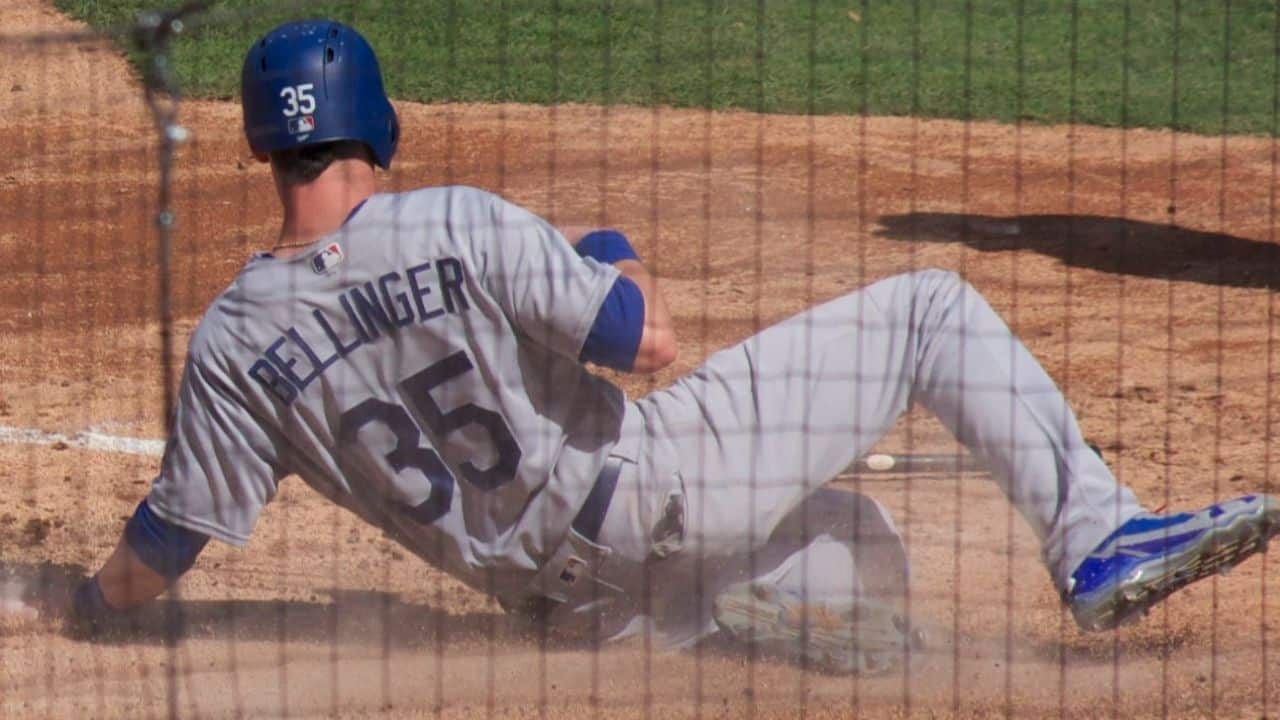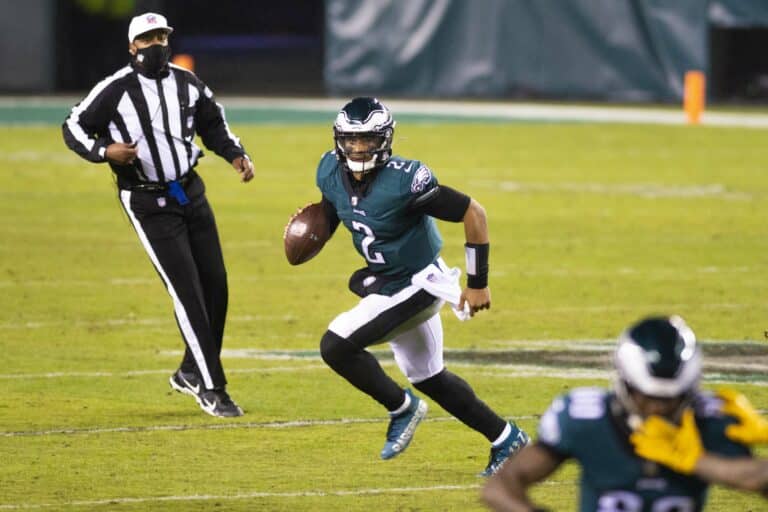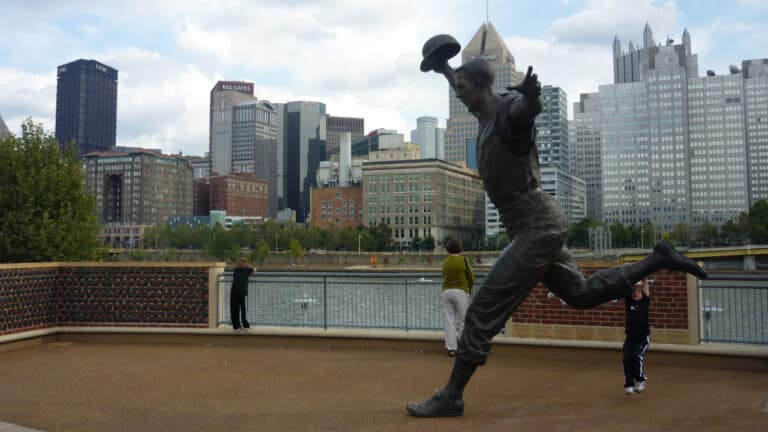31 MLB MVPs Who Also Won Rookie of the Year

Ronald Acuña Jr.

The Atlanta Braves 26-year-old outfielder is the most recent player to win MVP and ROY, winning the 2023 National League MVP trophy unanimously as a 25 year old after collecting all 30 first-place votes. It was an easy call after the 6-foot, 205-pounder led the league in hits (217), runs (149), stolen bases (73), at bats (643) and on-base percentage (.416). Throw in 41 homers and 106 RBI, and it’s a wrap. Acuña’s 2018 NL Rookie of the Year numbers as a 20 year old were also stellar, with .552 slugging and .356 on-base percentages, complemented by a .293 batting average, 26 home runs, 64 RBI and 78 runs.
Aaron Judge

Aaron Judge became the latest face of the New York Yankees franchise when the 6-7, 282-pound outfielder smashed on the scene in 2017 as the American League Rookie of the Year. The 25 year old posted league-leading 52 homers, 127 walks, 391 total bases and 128 runs, along with 114 RBI, .627 slugging percentages and .422 on-base percentages. Five seasons later, the six-time All-Star had a career year, posting league-leading 62 home runs, 131 RBI, 133 runs, 111 walks, .686 slugging and .421 on-base percentages in his 2022 AL MVP season.
Shohei Ohtani

Shohei Ohtani began his unique MLB journey as the 2018 American League Rookie of the Year after going 4-2 with a 3.31 ERA in 10 games as a pitcher, while also posting .564 slugging and .361 on-base percentages with 22 homers and 61 RBI in only 367 plate appearances as a 23-year-old designated hitter. In 2021, Ohtani became the AL MVP after posting .592 slugging and .372 on-base percentages, with 46 homers, 103 RBI, 100 runs and a league-leading 8 triples, while going 9-2 with a 3.18 ERA as a pitcher. The Angels DH won his second MVP award in 2023, going 10-5 with a 3.14 ERA while posting league-leading .654 slugging and .412 on-base percentages and 44 home runs.
José Abreu

The Houston Astros 37-year-old, three-time All-Star first baseman played the prime of his career as a Chicago White Sox slugger, starting off with his smashing debut AL Rookie of the Year season as a 27-year-old All-Star in 2014. There, the older rook, who had defected from Cuba a year earlier, had .383 on-base and .581 league-leading slugging percentages, with a .317 batting average, 36 homers and 107 RBI. Abreu later would win the 2020 AL MVP award as a 34 year old during the pandemic-shortened season, batting .319, with 19 home runs and 60 RBI in 60 games, with .360 on-base and league-leading .617 slugging percentages.
Cody Bellinger

Cody Bellinger started his career with a stellar 2017 National League Rookie of the Year campaign when the 21-year-old All-Star first baseman-outfielder had .581 slugging and .352 on-base percentages with 39 homers and 97 RBI. His best season was his 2019 NL MVP season when the 23-year-old outfielder had .629 slugging and .406 on-base percentage with a league-leading 351 total bases and 21 intentional walks, alongside a .305 batting average, 47 homers, 115 RBI and 121 runs.
Bryce Harper

The Washington Nationals teenage sensation captivated baseball as a 19-year-old outfielder in 2012, winning NL Rookie of the Year honors after posting .477 slugging and .340 on-base percentages, with 22 homers, 58 RBI and 99 runs. Bryce Harper fully grew into his potential three years later when the eight–time All-Star won the 2015 NL MVP award as a 22 year old, posting a league-leading 42 home runs, 118 runs, .649 slugging and .460 on-base percentages, with a .330 batting average and 99 RBI. The 6-3, 210-pounder later won a second NL MVP award in 2021 with his current team, the Philadelphia Phillies, posting a .429 on-base and league-leading .615 slugging percentages.
Kris Bryant

It was almost as if the Chicago Cubs All-Star third baseman entered the MLB ready-made from his rookie season, posting .488 slugging and .369 on-base percentages, with 26 home runs and 99 RBI out the box, en route to winning 2015 NL Rookie of the Year. The encore one season later was even more impressive when Kris Bryant, who later became a four-time All-Star, posted .554 slugging and .385 on-base percentages, with 39 homers, 102 RBI and a league-leading 121 runs.
Mike Trout

Mike Trout had one of the best seasons for a 20 year old in MLB history when the Los Angeles Angels centerfielder posted a league-leading 129 runs and 49 stolen bases, with .564 slugging and .399 on-base percentages, with .326 batting average, 30 homers and 83 RBI in his 2012 American League Rookie of the Year campaign. The 6-2, 235-pound, 11-time All-Star won the first of his three AL MVP awards two seasons later in 2014 after posting .561 slugging and .377 on-base percentages, with 36 home runs and a league-leading 111 RBI, 115 runs and 338 total bases.
Buster Posey

Buster Posey became the first MLB player to win his ROY and MVP trophies in World Series championship seasons, going double-winner in 2010 and 2012 with the San Francisco Giants. In 2010, the 6-1, 213-pound catcher posted .505 slugging and .357 on-base percentages, with a .305 batting average, 18 home runs and 67 RBI as the NL ROY. In 2012, the seven-time All-Star posted a league-leading .336 batting average with .549 slugging and .408 on-base percentages with 24 homers and 104 RBI as an NL MVP.
Justin Verlander

The 6-5, 235-pound right-handed pitcher made an immediate impact for the pennant-winning Detroit Tigers in 2006, going 17-9 with a 3.63 ERA in his American League Rookie of the Year season. Justin Verlander, a nine-time All-Star, then had his career year five seasons later when the 2011 AL MVP and Cy Young award winner dominated baseball with a league-leading 24 victories (24-5 record), .828 winning percentage, 2.40 ERA, 0.920 WHIP, 250 strikeouts and 251 innings pitched.
Ryan Braun

The 23-year-old Milwaukee Brewers third baseman took the National League by storm, winning the 2007 NL Rookie of the Year award despite playing only 113 games. But Ryan Braun made himself hard to ignore when he posted .370 on-base and league-leading .634 slugging percentages, along with a .324 batting average, 34 homers and 97 RBI in only 492 plate appearances. The converted outfielder won the 2011 NL MVP award four seasons later, posting .397 on-base and league-leading .597 slugging percentages, with a .333 batting average, 33 homers and 111 RBI.
Dustin Pedroia

Second baseman Dustin Pedroia could not have had a better year for an MLB newcomer, after leading the Boston Red Sox to the 2007 World Series title in his American League Rookie of the Year season, after posting .442 slugging and .380 on-base percentages, with a .326 batting average, 8 homers, 50 RBI and 86 runs. The 5-9, 170-pound, four-time All-Star amplified those numbers one year later as the 2008 AL MVP when the 24 year old posted a league-leading 213 hits, 118 runs and 54 doubles, with 17 homers and 83 RBI, alongside a .326 batting average, .376 on-base and .393 slugging percentages.
Ryan Howard

The 6-4, 250-pound Ryan Howard was an old rookie, at age 25, when he won 2005 National League Rookie of the Year in a partial season — only playing 88 games — and posting .567 slugging and .356 on-base percentages, with 22 homers and 63 RBI in only 348 plate appearances. The 26-year-old Philadelphia Phillies first baseman and the three-time All-Star won 2006 NL MVP a year later, posting a league-leading 58 home runs, 148 RBI and 383 total bases, along with .659 slugging and .425 on-base percentages.
Albert Pujols

Once upon a time, well before the 11-time All-Star first baseman began a 22-year MLB career, a 21-year-old Albert Pujols became the 2001 National League Rookie of the Year with the St. Louis Cardinals after posting .610 slugging and .403 on-base percentages, with .329 batting average, 37 home runs, 130 RBI and 112 runs. The 6-3, 235-pound slugger then won the first of three MVP awards four years later after posting .609 slugging and .430 on-base percentages, with a .330 batting average, 41 homers, 117 RBI and a league-leading 129 runs in 2005.
Ichiro Suzuki

After nine seasons in Japan’s Nippon Professional Baseball league, Ichiro Suzuki became a 27-year-old American League Rookie of the Year when the 5-11, 175-pound rightfielder had a monster debut season in 2001. Suzuki posted a league-leading .350 batting average, 242 hits and 56 stolen bases, with .457 slugging and .381 on-base percentages, with 8 homers, 69 RBI and 127 runs. For his efforts, the Seattle Mariners outfielder was also named 2001 AL MVP, making him the second player to earn ROY and MVP honors in the same season (Fred Lynn was the first in 1975).
Jeff Bagwell

The career-long Houston Astros first baseman made his rookie debut as a 23-year-old first baseman, with .437 slugging and .387 on-base percentages, along with a .294 batting average, 15 homers and 82 RBI, which was good enough to win the 1991 National League Rookie of the Year. The 6-0, 195-pound Hall of Famer would follow that up in 1994 with his NL MVP season, complete with a league-leading .750 slugging percentage, 300 total bases, 116 RBI and 104 runs, along with 39 homers, .451 on-base percentage and .368 batting average.
Jose Canseco

The Bash Brother won the 1986 American League Rookie of the Year trophy as a 21-year-old All-Star outfielder and capped that potential with the 1988 AL MVP award two years later. As an Oakland A’s rookie, Canseco hit 33 home runs with 117 RBI, with .457 slugging and .318 on-base percentages. The six-time All-Star outfielder amplified those numbers with 42 home runs and 42 stolen bases two years laters in his historic 40/40 season, becoming the first MLB player to hit 40 homers and steal 40 bases in the same season. In that MVP campaign, Canseco had a league-leading .569 slugging percentage, 42 homers and 124 RBI, with a .391 on-base percentage.
Andre Dawson

The 22-year-old Montreal Expos outfielder snuck on the scene back in 1977, winning the National Rookie of the Year after posting .474 slugging and .326 on-base percentages, with 19 homers and 65 RBI. Ten years later, “The Hawk” enjoyed a peak season during his 21-year Hall-of-Fame career, winning the 1987 NL MVP award after posting a league-leading 49 home runs, 137 RBI and 353 total bases, along with .568 slugging and .328 on-base percentages.
Cal Ripken Jr.

Before Cal Ripken became baseball’s iron man for playing 2,632 consecutive games, the Hall-of-Fame shortstop showed his durability as a 21-year-old Baltimore Oriole, posting .475 slugging and .317 on-base percentages, with 28 homers, 93 RBI and 90 runs in 160 games in his 1982 American League Rookie of the Year campaign. One season later, Ripken became the 1983 AL MVP after posting a league-leading 211 hits, 47 doubles and 121 runs, with .517 slugging and .371 on-base percentages after playing all 162 games. The 6-4, 200-pound Ripken won his second MVP in 1991 after posting .566 slugging and .374 on-base percentage with a league-leading 368 total bases.
Rod Carew

Nobody sustained greatness in baseball like Hall of Famer Rod Carew who was an All-Star the first 18 years of his career and won seven batting titles. The 6-0, 170-pound second baseman came on as a 21-year-old Minnesota Twins All-Star to win the 1967 American League Rookie of the Year, with .409 slugging and .341 on-base percentages, with a .292 batting average. Carew followed that up 10 years later as the Twins first baseman winning the 1977 AL MVP award, with a league-leading .388 batting average, .449 on-base percentage, 239 hits, 16 triples and 128 runs, along with 14 home runs and 100 RBI.
Thurman Munson

Thurman Munson became the New York Yankees seven-time All-Star catcher of the 1970s with a special start as the American League Rookie of the Year after debuting with .415 slugging and .386 slugging percentages, with 6 homers and 32 RBI in 132 games. Munson, who was a leader on the Yankees’ 1977 and 1978 World Series champion teams, had his AL MVP season in 1976 when he posted .462 slugging and .351 on-base percentages, with .302 batting average, 17 homers and 105 RBI. Munson’s career was cut short when he died in a plane crash in August 1979 at age 32.
Fred Lynn

Fred Lynn became the first MLB player ever to win Rookie of the Year and Most Valuable Player awards in the same season. In 1975, the Boston Red Sox nine-time All-Star outfielder, led the American League with a .401 on-base percentage and league-leading .566 slugging percentages, 47 doubles and 103 runs. The 6-1, 185-pound rook also had a .331 batting average, 21 homers and 105 RBI for the pennant-winning Red Sox, who also were featuring another stellar rookie outfielder that season — future Hall of Famer Jim Rice.
Pete Rose

“Charlie Hustle” lived up to his nickname from the get-go, making his 1963 MLB debut as National League Rookie of the Year as the Cincinnati Reds run-generating catalyst. The Reds second baseman posted .371 slugging and .334 on-base percentages, with 6 homers, 41 RBI and 101 runs. The 5-11, 192-pounder won his MVP award 10 years later in 1973 when the Reds leftfielder posted a league-leading .338 batting average and 230 hits, with .437 slugging and .401 on-base percentages, with 5 homers, 64 RBI and 115 runs.
Richard Allen

The Philadelphia Phillies 22-year-old third baseman had a stellar debut in 1964, combining power and speed to produce a league-leading 352 total bases, 125 runs and 13 triples, along with 29 home runs, 91 RBI, .557 slugging and .382 on-base percentages en route to NL Rookie of the Year. The man called “Crash” then had his career year as a 30-year-old Chicago White Sox first baseman in 1972 when the seven-time All-Star led the American League with 37 home runs, 113 RBI, 99 walks, along with league-leading .603 slugging, .420 on-base percentages and 1.023 OPS.
Johnny Bench

The early portion of Johnny Bench’s career tracks as one would expect from one of the greatest catchers who ever lived. As a 20-year-old newbie, the 6-1, 197-pound All-Star catcher won 1968 National League Rookie of the Year, after posting .433 slugging and .311 on-base percentages, with .275 batting, 15 homers and 82 RBI for the Cincinnati Reds. Bench then saw his bat explode in 1970 when he won the first of two NL MVPs, posting league-leading 45 home runs and 148 RBI, with 97 runs, .293 batting average, .345 on-base and .587 slugging percentages. The 14-time All-Star’s second MVP came two seasons later when the 24-year-old future Hall of Famer posted league-leading 40 homers and 125 RBI with .541 slugging and .379 on-base percentages.
Willie McCovey

Despite only playing 52 games in a 154-game season, the San Francisco Giants 21-year-old first baseman was so amazing in 219 plate appearances that he actually won 1959 National Rookie of the League honors. The Hall of Famer known as “Big Mac” and “Stretch” had a .656 slugging and .422 on-base percentages, with 13 home runs and 38 RBI in his shortened season. Ten years later, a 31-year-old McCovey translated those numbers out to a full season in 1969 when the six-time All-Star won NL MVP after posting league-leading .656 slugging and .453 on-base percentages, 45 homers and 126 RBI, along with a .320 batting average and 101 runs in 623 plate appearances.
Orlando Cepeda

The San Francisco Giants Hall-of-Fame first baseman had one of the best MLB seasons a 20 year old has ever had in his 1958 NL Rookie of the Year campaign, posting .512 slugging and .342 on-base percentages, with a .312 batting average, 25 homers, 96 RBI and a league-leading 38 doubles. The 6-2, 210-pound Cepeda, who became a 11-time All-Star, would maximize his potential nine years later as a St. Louis Cardinals first baseman, posting .524 slugging and .399 on-base percentages with a .325 batting average, 25 homers and 111 RBI, en route to winning the 1967 NL MVP.
Frank Robinson

Hall of Famer Frank Robinson was dominant from the start of his career, winning the 1956 National League Rookie of the Year when the Cincinnati Reds All-Star outfielder posted .558 slugging and .379 on-base percentages, with 38 home runs, 83 RBI and a league-leading 122 runs. The 6-1, 183-pounder boosted those numbers in his 1961 NL MVP campaign with a league-leading .611 slugging percentage, along with a .404 on-base percentage, .323 batting average, 37 homers, 124 RBI and 111 runs. The 14-time All-Star won his second MVP award in 1966 as a Baltimore Orioles outfielder in their World Series championship year, posting league-leading .637 slugging and .410 on-base percentages, .316 batting average, 49 homers, 122 RBI, 122 runs and 367 total bases
Don Newcombe

Don Newcombe immediately took charge as a 23 year old, going 17-8 with a 3.17 ERA as an All-Star and winning National League Rookie of the Year. Seven years later, the 6-4, 220-pounder took both the 1956 AL MVP and MLB Cy Young awards, as the four-time All-Star posted a league-leading 27 victories (27-7 record), .794 winning percentage and 0.989 WHIP, along with a 3.06 ERA in the Dodgers’ pennant-winning season.
Willie Mays

The “Say Hey Kid” was just a 20-year-old New York Giants outfielder when he won 1951 National League Rookie of the Year honors after posting .472 slugging and .356 on-base percentages with 20 homers and 68 RBI. After serving most of the next two MLB seasons in the military, the 24-time All-Star later showed his Hall-of-Fame clout in his 1954 NL MVP season for his World Series champion Giants, with a league-leading .667 slugging percentage, .345 batting average, 13 triples, along with a .411 on-base percentage, 41 homers, 110 RBI and 119 runs. The 5-10, 170-pound Mays won a second MVP award in 1965 after leading the league with .645 slugging and .398 on-base percentage.
Jackie Robinson

When Jackie Robinson broke baseball’s color barrier and became the first African-American to play in the majors in 1947, the 28-year-old Brooklyn Dodgers second baseman was brilliant from the get-go. Robinson finished first in the NL Rookie of the Year voting and fifth in the MVP vote. The 5-11, 195-pound Robinson posted a .427 slugging and .383 on-base percentages, with 12 homers, 48 RBI, 125 runs and a league-leading 29 stolen bases for the pennant-winning Dodgers. Two seasons later, Robinson won the NL MVP award after posting league-leading .342 batting average and 37 steals, with .528 slugging and .432 on-base percentages, 16 homers, 124 RBI and 122 runs for the pennant-winning Dodgers.





